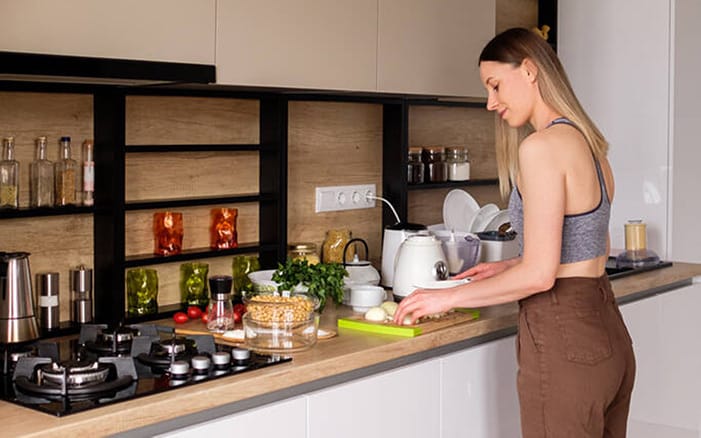What you eat in the 12 hours before a half marathon can shape your race as much as your training.
A solid dinner the night before builds your glycogen stores and a good breakfast on race morning tops them off. Get both right, and you’ll have steady energy without stomach problems. Get them wrong, and you risk sprinting to the nearest porta-potty mid-race.
Here’s how to fuel before a half marathon.
Dinner the night before: build your fuel reserves
Your goal at dinner isn’t to eat a “carb feast” but to load your muscles with fuel. Aim for roughly 60% of your calories from carbs, about 20% from lean protein, and 15–20% from healthy fats.
Drink water with your meal, but don’t chug—you want to wake up hydrated, not bloated.
Skip alcohol, which interferes with recovery and hydration, and avoid heavy caffeine late in the evening if it disrupts sleep.

10 dinner examples that work best before a race:
- Grilled chicken breast with white rice and steamed carrots
- Salmon with baked sweet potato and zucchini
- White or light whole-wheat pasta with tomato sauce and turkey meatballs
- Baked potato with grilled chicken strips and a small portion of cooked vegetables
- White rice with grilled fish and a side of sautéed spinach
- Teriyaki chicken with rice and stir-fried bell peppers
- Couscous with grilled salmon and roasted squash
- Grilled turkey with mashed potatoes
- Rice with lightly seasoned shrimp and roasted zucchini
- Plain pasta with olive oil and grilled chicken on the side
Keep flavors simple. Save the creamy sauces or spicy curries for after the finish line.
Breakfast on race morning: top up, don’t overload
Eat 2–3 hours before the start. The focus is easy-to-digest carbs with a little protein, minimal fat or fiber.
Pair breakfast with 16–20 oz (500–600 ml) of water or a sports drink. In the last hour, stick to small sips only.
Coffee counts here. If you usually drink it, one small cup can help with alertness and digestion. Many runners rely on it to stimulate a bathroom trip before heading to the start. But race day is not the time to try coffee if you normally don’t—it can cause jitters or stomach upset.
10 breakfast options that keep energy steady:
- Oatmeal made with water, topped with banana and honey
- White rice with a small portion of scrambled egg
- White toast with a thin layer of peanut butter and half a banana
- Creamy white rice cooked with plant milk and a little sugar or honey, topped with banana slices
- Plain pancakes with a bit of syrup
- Plain waffles with jam or honey
- Cream of wheat with a spoonful of raisins
- Banana with a plain granola bar
- Plain bagel with jam
- Applesauce pouch with half a plain bagel
If nerves make eating hard, go smaller—banana with sports drink is better than nothing.
Snacks and last-minute fueling
If your race starts late, add a light snack 30–60 minutes before. A banana, handful of pretzels, or small energy bar is plenty. A few sips of sports drink can keep glycogen topped up without weighing you down.
What to avoid
Before your half marathon, cross these foods off the list:
- Beans, lentils, or other high-fiber foods
- Cruciferous vegetables (broccoli, cauliflower, cabbage)
- Bran cereals or bread with lots of seeds
- Fried foods (fries, nuggets, anything greasy)
- Cream-based sauces or heavy cheese dishes
- Spicy or heavily seasoned foods
- Large protein portions (steak, big omelets)
- Sugary desserts and drinks that spike and crash your blood sugar
- Energy drinks with high caffeine
- Alcohol
- Any food or drink you haven’t tested during training
Related: 10 Foods and Drinks to Avoid Before Your Run: A Comprehensive Guide
Eat foods you know, in amounts you’ve practiced, and avoid last-minute experiments. If coffee or certain foods reliably help you feel comfortable and clear your bowels on race morning, keep them in—if not, skip them.









